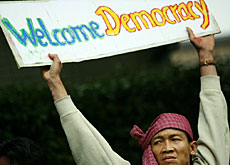ICRC forced to close field offices in Myanmar

The Myanmar government has ordered the Swiss-run International Committee of the Red Cross (ICRC) to shut down its five field offices outside Yangon.
The Geneva-based organisation said on Monday the decision made it impossible to carry out assistance and protection work for civilians, especially in border areas.
According to the ICRC, Myanmar’s regime demanded it close its field offices in Mandalay, Mawlamyine, Hpa-an, Taunggyi and Kyaing Tong. The organisation’s visits to detainees, halted in December 2005, will not be allowed to resume either.
The ICRC has “deplored” the decision, saying that it jeopardises the humanitarian work already carried out among the population, in particular people held in prison or living in sensitive border areas.
“We had years of productive discussions with the Myanmar government, and our work since 1999 has had a tangible impact on people’s living and security conditions,” said Pierre Krähenbühl, the organisation’s director of operations in a statement.
“The ICRC is seriously worried that those most in need today will bear the brunt of the current standoff.”
According to the organisation, the five offices allow it to carry out its operations where they are the most needed. “The closure of these offices means our work is seriously hampered,” ICRC spokeswoman Claudine Haddad told swissinfo.
Besides visits to detainees, assessments of the situation of civilian populations in border areas, aid and assistance for water and sanitation are among the work that has been cut back.
The only work underway is very limited rehabilitation activities in favour of amputees but it is not clear if they will be pursued if the field offices are shut.
No reason given
There has been no reason given why the ICRC field stations should be closed. According to Haddad, the organisation has been trying to re-establish a dialogue with Myanmar.
The last attempt took place less than two weeks ago in Geneva, with ICRC President Jakob Kellenberger meeting with Myanmar’s ambassador to the United Nations. These discussions have led nowhere so far.
The organisation says at this stage it is waiting for a signal from the Myanmar authorities to resume talks, but stresses that for the moment the situation is deadlocked.
“We are in a situation where we cannot carry out our mandate as granted to us by the international community,” said Haddad. “We will have to reduce our activities further.”
The ICRC, which stresses it has not been expelled, is now adopting a wait-and-see approach.
“The worst-case scenario is that the ICRC maintains a limited presence in Yangon in order to hopefully allow the resumption of a meaningful dialogue with the government of Myanmar,” added Haddad.
swissinfo, Scott Capper

More
International Committee of the Red Cross
Myanmar has been under military rule of one form or another since 1962, during which time its economy has collapsed and dozens of ethnic militias have waged civil war against the Burmese-dominated central government.
The United Nations says the junta has more than 1,100 political prisoners under lock and key.
Nobel peace laureate and opposition leader Aung San Suu Kyi is also under house arrest.
The ICRC, which employs 264 people including 24 expatriates in Myanmar, began working there in 1986 providing physical rehabilitation for mine victims and other disabled people.

In compliance with the JTI standards
More: SWI swissinfo.ch certified by the Journalism Trust Initiative









You can find an overview of ongoing debates with our journalists here . Please join us!
If you want to start a conversation about a topic raised in this article or want to report factual errors, email us at english@swissinfo.ch.